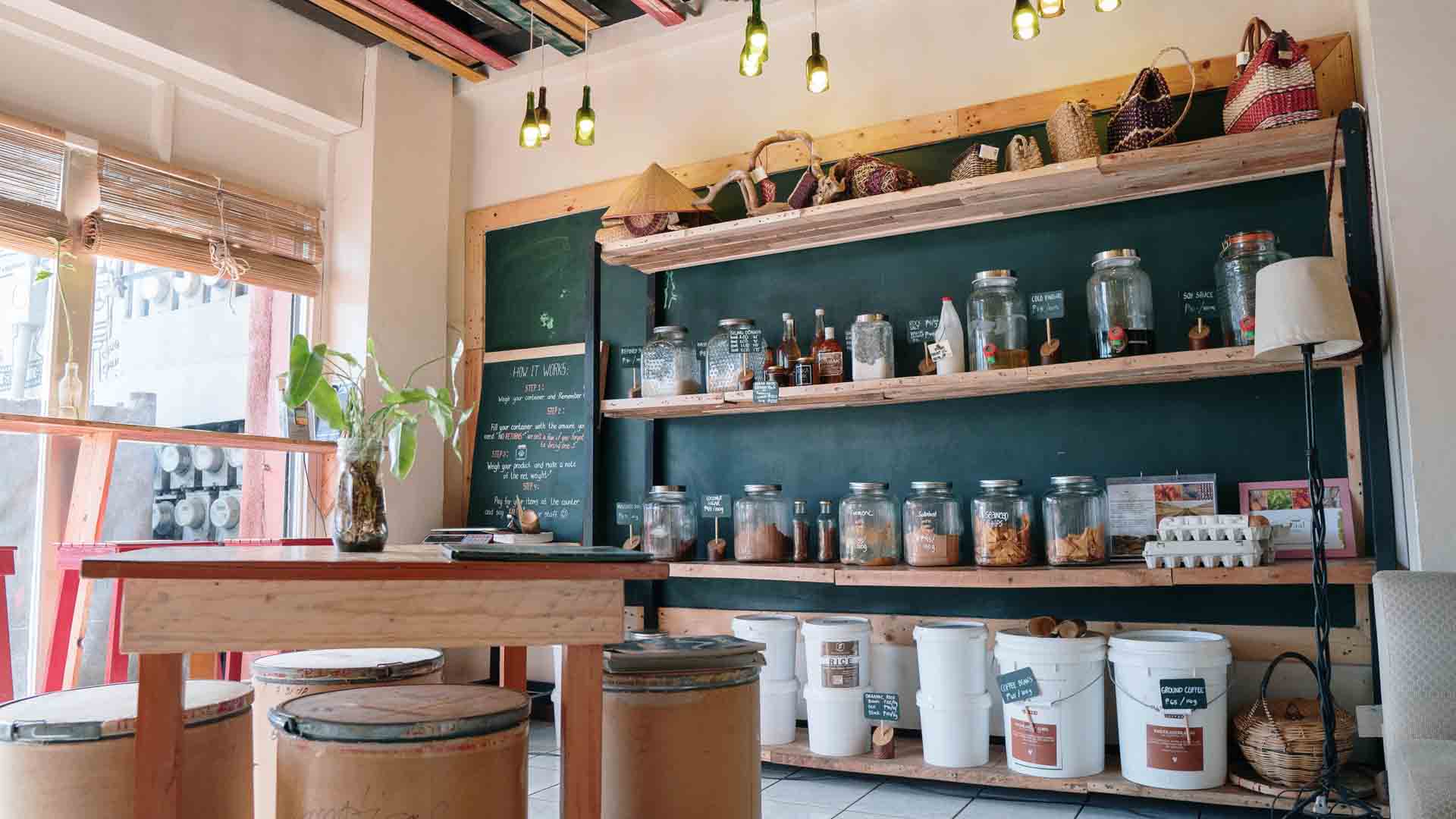Sari-sari or neighborhood stores are the go-to for most Filipinos for their daily necessities. By selling products in small quantities, sari-sari stores enable households with a meager income to purchase their needs for the day. Sadly, these neighborhood stores also serve as a major point of sale for problematic products. Most of the products sold in these stores are packaged in plastic sachets.
Inspired to empower existing sari-sari stores to transition to Zero Waste, the Philippine Reef and Rainforest Conservation Foundation, Inc. (PRRCFI) launched Bacolod City’s first Zero Waste store, Wala Usik Tiangge + Kapehan, in January 2019. Wala Usik is a Hiligaynon phrase which means ‘no wastage.’

Although it is a business, Wala Usik is considered a non-profit. The capital is from fund-raising and grants, and the income goes to the conservation and advocacy work of the Foundation.
The physical store was constructed using repurposed and recycled materials. Tables and shelves are made from crates and pallets. Bar stools are sourced from surplus shops. The chandelier and lamps are upcycled from scavenged wine bottles.
Inside the tiangge (store) are dispensers filled with liquid household laundry and dishwashing products, huge glass jars and barrels filled with different kinds of condiments and staples, personal care products, and reusable items.
According to PRRCFI Executive Director Dave Albao, one of the initial challenges they faced was how to dispense the products. “Big jars and containers are expensive. We had to fabricate and reconstruct mechanisms to refill products without contamination. Regulatory barriers have been an issue as well. The Food and Drug Administration (FDA) does not allow refills of shampoo and cosmetics,” he said.
But these initial roadblocks did not stop them from pursuing their vision. “We believe if nobody tries, studies, and tests, there is no step forward. So, we took the risk. Through our innovation laboratories, we conducted workshops to prototype, modify, and redesign [our store],” Dave said.
Wala Usik is a haven of local producers that attracts Zero Waste advocates, environmental activists, and socially aware citizens who regularly bring their own containers and bags to store their purchased products in. It also gathers local social enterprises with the philosophy of reducing the ecological footprint of importing foreign and unnecessarily packaged products.
Wala Usik also has a cafe that serves various local coffees, pastries (made by Bacolod-based foundations) and snacks from consignor community organizations. It also serves as a co-working space for collaborations with other environmental advocate groups. The cafe has been a venue for several Wala Usik workshops.
Wala Usik in the Barangays
To bring Wala Usik to other places, PRRCFI held a Wala Usik Sari-Sari Store Design Workshop in February 2019 in Sipalay City, Negros Occidental to engage sari-sari store owners and other key stakeholders in designing and producing prototypes of the stores. Participants included artists, retail and industrial designers, LGU personnel, business consultants, and sari-sari store owners selected from SWEEP (Sea Waste Education to Eradicate Plastic) project barangays.

The first partner Wala Usik Sari-Sari store in Negros Occidental was launched in April 2019. Today, there are eight Wala Usik Sari-Sari stores in Negros Occidental: one each in the cities of Bacolod, Sipalay and Bayawan and the municipalities of Cauayan, Hinoba-an, Sta Catalina, Basay, and Siaton.
The owners determined the products they wanted to sell based on the interest of the consumers in their own communities. Sachets have been replaced with micro-refilling stations. A kilo of rice is put in a reusable container instead of a plastic bag. Cooking oil, vinegar, and other condiments are dispensed using reusable or repurposed containers, in incremental volumes and price points similar to products in sachets, but without the single-use packaging. The store owners lend containers to the customers, who then return them every time they go back to buy something, or when they bring their own containers to use to refill.
COVID-19 and the New Normal
Like other businesses, Wala Usik also suffered challenges due to the pandemic, forcing the management to close the physical store while redesigning its operation and transition into an online store.
“Most of the partner sari-sari stores are also adjusting their operations depending on quarantine and public health protocols. It will be interesting to see how these stores will evolve because of the pandemic,” Dave stated.

Dave still hopes to re-open Wala Usik Tiangge when the situation improves. They are still committed to continuing the replication of the model, and to scale their learnings from this first cycle to expand their advocacy towards developing a small food forest. According to him, it is important to engage with the community despite the current situation of limited movement.
“The advocacy is still there. There are many ways to address the challenges of refilling in the communities. Wala Usik Tiangge + Kapehan and the sari-sari stores have paved and are paving a path for designing a refilling model that is safe, sustainable, accessible, and affordable for our communities,” he said. “Imagine if 10% of sari-sari stores in the Philippines are wala usik, how much more ocean plastics we can prevent.”
Facebook: https://www.facebook.com/walausik.tiangge/
Instagram: https://www.instagram.com/walausik.tiangge/About the writer








